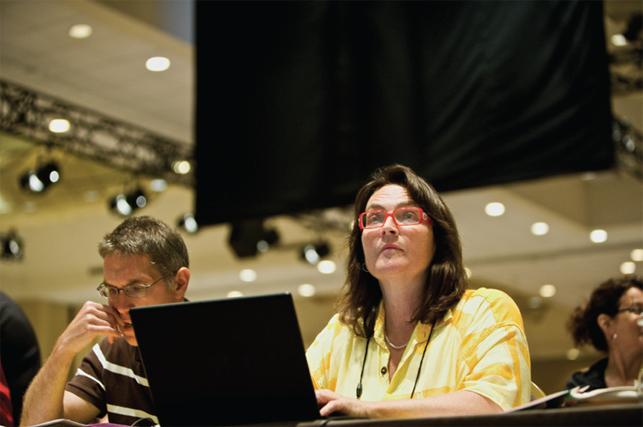
Debi Wells: Teacher, Union Leader, Social Activist
Ontario Elementary Teachers are a diverse group of individuals with many strengths and talents. In a collective sense, we tend to be problem solvers, ready to tackle the many challenges that confront us in our professional lives. At the same time, we strive to achieve balance in our personal lives both at home and within the community. Multitasking is virtually second nature to the average elementary teacher and something at which we excel.
Debi Wells, vice-president of the Limestone Teacher Local fits this paradigm in all respects. Teacher, union leader, political/social activist, wife and mother, Wells is a person who wears a variety of hats, often simultaneously. “There are many different ways one can live,” she says. “You can live thinking nothing can be changed and what is, is good enough. Or you can think it could be better and if I give it a good go, it can be better.”
Born in Hamilton, Bermuda, Wells grew up in Montreal, Sarnia, and Kingston. Her passion for political issues was forged in the era of the Chicago Riots and the Vietnam War protests of the late 1960s and early 1970s. She recalls lively debates around the dinner table with her dad, a life-long Conservative from Cape Breton. “I never won because my dad was quite a fast talker but he never won either because I knew that I was right.” Arguments ranged from women’s rights to apartheid, to whether police had the moral authority to beat up Vietnam War demonstrators.
These early formative experiences facilitated Wells’ ability to articulate her point of view and when she moved on to York University, where she studied political economics, she became an active participant in the protests against the war and racism, as well as an ardent supporter of the women’s rights movement. Later, she acquired her master’s in Canadian studies at Carleton University in Ottawa and worked part-time as an educational assistant for a class of children with behavioural problems.
Wells decided to enter teaching in the mid 1980s and enrolled at McArthur College, Queen’s University. Working in the Kingston area as a core French teacher, she moved from one classroom to another, and soon found herself in the unique position of observing other teachers’ concerns and problems from a first-hand perspective. “Teachers are generally not political,” observes Wells. “We read a lot, we work with paper a lot, we have lots of great skills but we’re not used to standing up for ourselves.” As an individual who had always spoken up for the rights of others, she gradually became an unofficial spokesperson for the teachers with whom she worked.
Many Teachers in Ontario experienced a rude political awakening after the provincial Tories, led by Mike Harris came to power in the mid-90s. As the government dismantled social and public services and waged a relentless campaign against the education system, a groundswell of opposition grew that finally spilled over into the two-week provincewide political protest mounted by teachers and their unions.
Reflecting back on that time, Wells says, “I think that at a certain point people have to either decide to put up with what’s going on even if they don’t like it or work to change things.” A “boat-rocker” from way back, she opted to increase her involvement within the local federation. Beginning as a picket captain during the protest, Wells gradually assumed other positions within the union before being elected vice-president of the Limestone Teacher Local in 2002.
She firmly maintains that teachers can be agents for change both within the education system and the broader community: “The line that I take with teachers is that we have more education, higher wages, more flex time and more ability to speak in public than almost anybody in Canada.” Through her participation with a number of community-based organizations such as the Kingston Action Network, the Kingston District and Labour Council, and the Kingston Economic Development Corporation, she has discovered that people listen to what she has to say because she is a teacher. It is an empowering insight, one that all elementary teachers should take to heart.
Subscribing to the precept that strength lies in numbers, Wells began to push her union to become more actively engaged with the local labour council. “I think that if teachers and their unions are to really succeed, they must become part of the community in such a way that they are needed and respected,” she says. In 2006, she was asked to become vice-president of the Kingston District and Labour Council, which represents almost every union in the area. Within two years, she had become president of this organization, where she now acts as the official spokesperson for over 10,000 unionized workers.
“There is only so much political activity you can cram into a day,” Wells says, but she has no intention of decreasing her current level of involvement. She is understandably proud of her work within the Limestone Teacher Local, believing that she still has goals to achieve and issues that need to be addressed and resolved. “The bottom line,” she says, “is that ETFO does take care of elementary teachers, ensuring that working conditions are acceptable and that health and safety concerns are handled appropriately. Our union offers a huge protection for teachers and provides peace of mind.”
Wells draws a sharp contrast between the working conditions and attitudes of secondary teachers and those of the elementary panel and strongly endorses ETFO’s Close the Gapinitiative. “At some point [in our dealings with the province/boards] we have to say ‘no’ and I think that we will. We have to take one step at a time; we’re going to change things eventually.”
She is also a strong advocate for the younger teachers within the profession, who are “being buried” by the demands of the job, and maintains that ETFO and the various locals must remain sensitive to the specific challenges that these individuals experience so that “we don’t lose them.”
At sometime in the future, she might be interested in running for president of the Limestone Teacher Local, although she hastens to add that she is happy with the status quo that she and president Mike Lumb have evolved over the past seven years: “We’re good at what we do and have more experience than most people at the board office. We have a team that’s working well.”
For now though, this multitasker par excellence plans to continue doing what she does best: advocating for the rights of workers. “I’m very proud of the work I’ve done,” says Debi Wells, “and I can do it better because I’m a teacher.”

